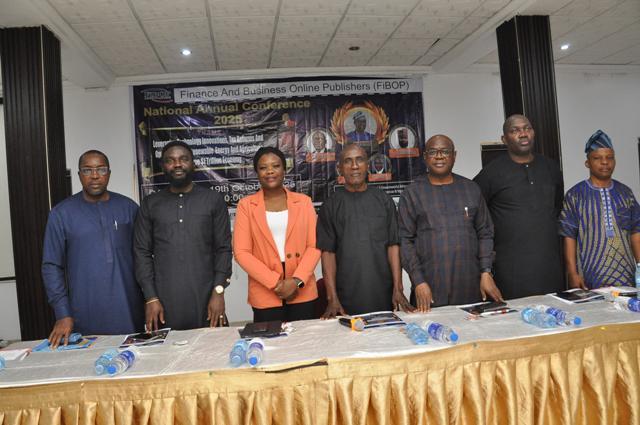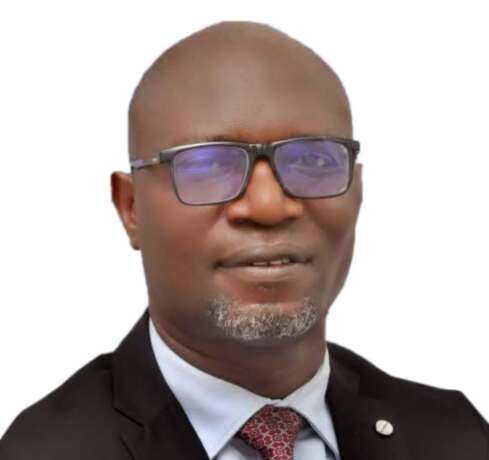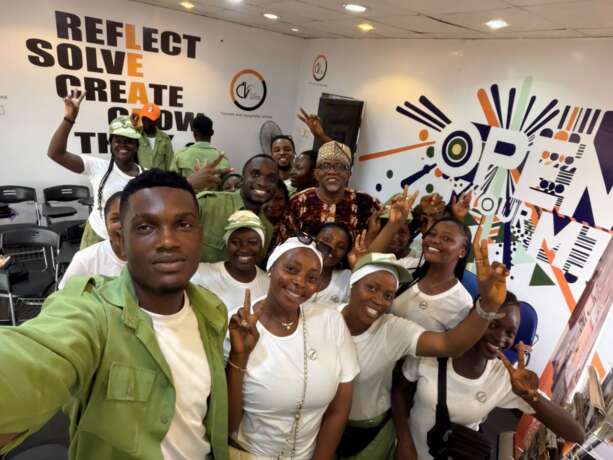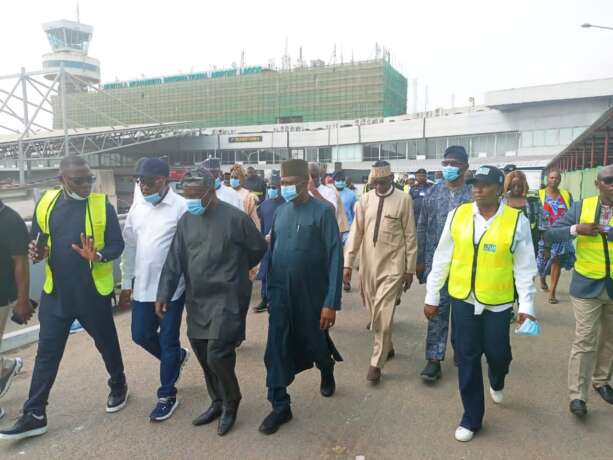
Photo caption: L-R: Mr Babatunde Apeji, Principal Manager, Projects at Nigerian Communications Commission (NCC); Mr. Jolaolu Fakoya, Executive Director, Technical, emPLE Life Assurance Limited and President, Nigerian Actuarial Society (NAS); Jamila Umoru, Principal Manager, Lagos Zonal Office, NCC; Mr. Charles Onwuatogwu, President of FiBOP; Mr. Ademayowa Adeduro, MD/CEO, Tangerine General Insurance; Mr Wilson Esene-Okoh, Head, Corporate Communications at Rex Insurance Limited and Mr. Titiloye, Branch Manager, Lagos Office of the Nigerian Agricultural Insurance Corporation (NAIC) at FiBOP’s 2025 National Conference in Lagos at the weekend.
…Says Sector Is The Nervous System,
Invisible Backbone Of Other Sectors
The Executive Vice Chairman/CEO
Nigerian Communications Commission (NCC), Dr. Aminu Maida has said that the telecommunications sector must be invested in and also protected if the country must achieve the $1trillion economy in 2030.
This is just as he described the sector as the invisible backbone that powers all other sectors.
He listed the sectors being empowered by telecommunications to include: oil, agriculture, extractive, manufacturing, among others.
Maida, who was represented by the Maida, who was represented by the Commission’s Principal Manager, Babatunde Agbeji, said this while presenting.a paper titled, “Protection of Critical National Information Infrastructure (CNII) and Building Industry Resilience as a Crucial Component of the Commission’s Contribution to Achieving a $1 Trillion Economy” at the Finance & Business Online Publishers(FIBOP) at the weekend at Orchid , Lekki, Lagos.
He argued that when the issue of building a $1 trillion economy is discussed, Nigerians tend to focus on sectors such as oil, agriculture, manufacturing, extractive or trade, but unknown to them that the invisible backbone that powers all these sectors is the digital infrastructure.
He pointed out that from banking transactions to health records, from e-learning to e-commerce, and even the security of borders, modern Nigeria runs on the resilience of information and communication networks.
Maida argued that in view of the importance of the CNII, it is not just a simply a technical matter but that it is a matter of economic survival and national sovereignty.
Speaking further on the why CNII is very crucial to the economic development of Nigeria, the NCC boss quoting the National Bureau of Statistics(NBS) Quarter 2 of 2025, said that telecommunications presently contributes over 15 per cent to Nigeria’s GDP. but that the influence of what the sector does in truth goes beyond statistics.
According to him, “It is the nervous system of our economy—without which financial inclusion, digital trade, governance, national security and e-commerce cannot thrive. Yet, this nervous system is under constant attack.”
Maida lamented that between January and August this year, over 26,000 fibre cuts, vandalism incidents, and theft cases were recorded across operators.
This, in addition to the rising tide of cyber intrusions and ransomware attacks, it becomes crystal clear:that defending CNII is defending Nigeria’s economy.
He hinted that NCC’s response to these threats in recognition of the critical role it plays in the economy, prompted the present administration led by President Bola Tinubu has used the Cybersecurity Act to formally designate telecommunications infrastructure as a national security asset.
He noted that guided by this mandate, the Commission has adopted a multi-pronged approach to safeguarding CNII, which rests on five key steps.
He listed the keys to include :
- Regulation, Compliance & Enforcement – Setting clear guidelines for operators, strengthening compliance monitoring, and enforcing sanctions where rules are breached. This ensures all licensees play their part in protecting national assets.
- Publicity, Awareness & Education – Driving campaigns across radio, TV, social media, and communities to educate citizens on the importance of protecting telecom infrastructure and the consequences of vandalism.
- Collaboration – Working closely with the Office of the National Security Adviser (ONSA), Nigeria Security and Civil Defence Corps (NSCDC), the Police, State Governments, the Ministry of Works, utility providers, and communities to coordinate joint protection of fibre routes, towers, and other CNII assets.
- Mediation – Engaging stakeholders proactively to resolve disputes—such as right-of-way charges and cross-sector issues—that can otherwise create vulnerabilities or delays in infrastructure protection.
- Use of Force as a Last Resort – Where necessary, deploying security agencies and applying the full weight of the law to deter sabotage, vandalism, or theft of telecom assets.
Through this layered approach, we are not only securing the present but also laying the foundation for a more resilient digital future.
Speaking further, Maida contested that
protection of these telecommunications national assets alone is not enough, adding that If Nigeria must achieve the $1 trillion economy, “we need resilient networks—systems that can bend without breaking, recover quickly from shocks, and keep the nation connected even in times of crisis.”
He said that to make the networks resilience, the NCC is moving deliberately from protection to resilience through:
• Telecoms Disaster Recovery and Business Continuity Guidelines – Establishing a framework for preparedness, mutual aid agreements, rapid service restoration, and consumer education during emergencies.
• Cyber security and Incident Response :
Through our Sectoral Computer Security Incident Response Team (CSIRT) and the soon-to-be-launched Cyber security Framework for the Telecom Industry, we are building a frontline defence that can anticipate, detect, and contain threats.
The newly Major Network Outage Portal now ensures operators must report significant disruptions, while consumers are kept informed and compensated where necessary.
• Stronger Infrastructure Standards
We have enhanced compliance checklists for Tower Companies (TowerCos), requiring robust site security, redundant power systems, and climate-resilient designs.
For rural sites, he said “we are mandating solar backup, dual backhaul, and community partnerships to ensure connectivity is not lost in underserved areas..”







